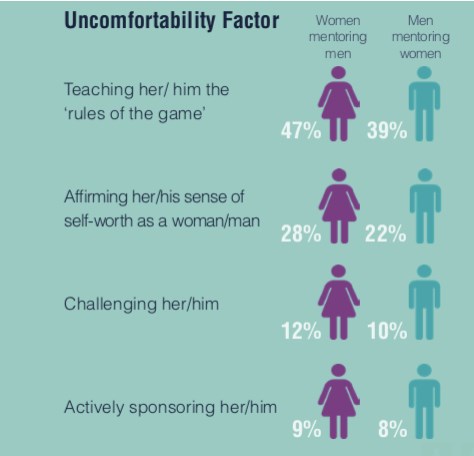New research finds Aussie men twice as likely to be scared of working with women
Online mentoring platform, Art of Mentoring, has today released new research that looks at how the #MeToo movement has affected working relationships between men and women.
Art of Mentoring surveyed 450 women and 150 men (mostly Australian) across varying work situations and levels of responsibilities. The survey results revealed the activities which caused the biggest change in male behaviour post #MeToo.

Pre #MeToo:
● * 7% of men felt uncomfortable working alone with a female colleague
● *7% of men felt uncomfortable attending evening work events with a female colleague
● *7% of men felt uncomfortable socialising with a female colleague
● *3% of men felt uncomfortable mentoring a female colleague
Post #MeToo:
● *15% of men felt uncomfortable working alone with a female colleague
● *13% of men felt uncomfortable attending evening work events with a female colleague
● *12% of men felt uncomfortable socialising with a female colleague
● *6% of men felt uncomfortable mentoring a female colleague
The report also revealed that while a small number of men and women said they were uncomfortable mentoring the other gender, the biggest level of discomfort from men was teaching women the ‘rules of the game’ (39%) and affirming a woman’s self-worth (22%).

Melissa Richardson, Director of Art of Mentoring, said her company conducted this research to raise awareness of the negative impact the movement has had on men and women in the workplace within Australia. She also wanted to raise awareness of the importance of mentoring women correctly.
“One of the by-products that came out of the #MeToo movement was the unfortunate increase in men who felt, and continue to feel, uncomfortable or unwilling to interact with the opposite sex. Overcoming this obstacle is important for workplaces, as a continuation of this behaviour will undoubtedly decrease the opportunities women have at work,” she said.
“It’s essential that cross-gender relationships are cultivated in the workplace, not only to promote diversity, but for the value cross-gender mentoring brings to a company’s cultural development,” added Richardson.
Richardson’s report also highlights the need for more men to step up through mentoring to help bridge the gap for workplace gender issues. It highlights practical strategies men can take to encourage mentorship of their female colleagues.
Melissa Richardson said cross-gender mentoring required taking the time to understand the other gender’s patterns
of behaviour and gender stereotypes.
“Women should not assume that men are happy to be the full-time breadwinner. In doing so, they continue to perpetuate gender biases in the workplace. Interestingly, our survey revealed, that 64% of men versus 58% of women found it more difficult to choose between balancing work and family.”
A strategy recommended by Richardson to counteract the stigma of sexual harassment post #MeToo was to implement a formal mentoring program with an agreed structure and code of conduct.
Following its research findings, Art of Mentoring, intends to release a mentoring program later this year to guide men and women in the workplace to foster more effective mentoring relationships with women, and eventually even the playing field.
Survey details
Art of Mentoring conducted a survey in line with that of LeanIn.Org founder, Sheryl Sandberg, to understand the impact of #MeToo on workplace attitudes outside the US. We found the same theme as the US study, that men (more so than women) feel less comfortable than they did a year ago with cross-gender workplace interaction.
Organisations can support men by providing mentoring programs that have defined Codes of Conduct, specific training for mentors and targeted selection and matching criteria that honours both parties in a mentoring relationship.
About Art of Mentoring
Art of Mentoring is a mentoring program design and implementation business based in Australia and operating across Asia-Pacific, Europe and the United States. They offer the latest in mentoring best practice with a vast range of evidence-based programs, expert consultants, the latest technology and world-class resources to support the design and implementation of effective mentoring in your organisation.
The company has been conducting mentoring programs since 1997, webinar-based mentoring programs since 2009, and online training since 2014. Its management is supported by an expert team of Program Designers and Managers.| < Prev | Next > |
|---|





